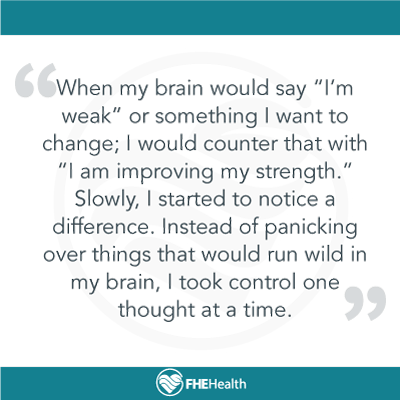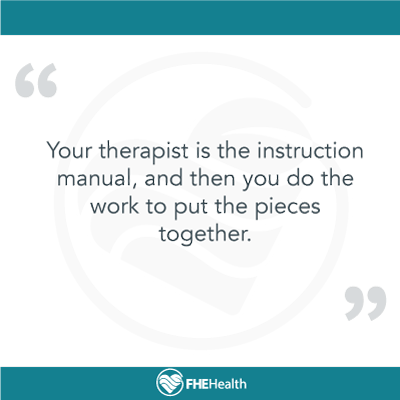
A previous therapist of mine had a quote on her wall. It said, “Change your thoughts, and you change your world.” I will be the first to admit that I had no idea what that meant as a teenager. Now I know that it is a nod to Cognitive Behavioral Therapy. But what exactly does it mean, and how can it be used to help manage depression?
What is Cognitive Behavioral Therapy?
According to the Merriam-Webster Dictionary, Cognitive Behavioral Therapy is “psychotherapy that combines cognitive therapy with behavior therapy by identifying faulty or maladaptive patterns of thinking, emotional response, or behavior and substituting them with desirable patterns of thinking, emotional response, or behavior.” That is a long way to say that changing thoughts eventually changes actions. It’s like training the brain to stop trash-talking you.
How Does it Work?
The short version of this question is that it is a process of identifying the mental hindrances in your thought patterns and changing them to create the positive actions you desire. That is a highly simplified version of how it works. If you would like a more detailed answer, check out this article on Cognitive Behavioral Therapy and how FHE can help you use it in your recovery.
My Experience with CBT
 I’m going to be real with you. Until recently, I never even liked the idea of CBT. It seemed too simplified to me. I simply didn’t understand how changing my thoughts could change the root of my struggles, and unhealed trauma. It was a podcast from Leadership Coach Kyla Cofer that helped me realize that I’ve been using CBT in my life and recovery as one of the many tools in my toolbox.
I’m going to be real with you. Until recently, I never even liked the idea of CBT. It seemed too simplified to me. I simply didn’t understand how changing my thoughts could change the root of my struggles, and unhealed trauma. It was a podcast from Leadership Coach Kyla Cofer that helped me realize that I’ve been using CBT in my life and recovery as one of the many tools in my toolbox.
Recently, I realized that since I am no longer constantly existing in crisis mode, I can work on what I want to. I decided that I wanted to work on my mental resilience. For the longest time, my brain has told me what I “can’t do” and what I “am not.” It likes to tell me that I am not strong or creative. If it can find a weakness, it does.
I remember very clearly the moment I decided to change that. I said, “I’m going to work on being more mentally resilient.” I knew I had to change my thoughts, even just one at a time. I had to be intentional about it. The first thing I did was write positive words on my bathroom mirror. Sharpies work fantastic and come off easily with window cleaner. Anyway, I wrote the words that I needed to believe about myself. Then, when I am getting ready in the morning, I tell myself, “I am intelligent. I am creative,” until it doesn’t feel awkward, and I believe it about myself. I’m still working on the believing part, but eventually, it will come.
The next thing I started doing was being aware of my thoughts. When my brain would say “I’m weak” or something I want to change; I would counter that with “I am improving my strength.” Slowly, I started to notice a difference. Instead of panicking over things that would run wild in my brain, I took control one thought at a time. It’s not perfect, but it’s an improvement. It turns out this improvement is expected among those who use CBT.
CBT Works
Cognitive Behavioral Therapy, like any other tool, works well when practiced. CBT has been a highly studied method of therapy. Studies show that it can bring some relief to several areas of mental health struggles. It is so well known it is even used in sports psychology to help athletes overcome performance struggles.
When beginning your journey with CBT, there will be steps that you and your therapist take. You will need to identify actions you want to change, then the thoughts behind them, and the reason for those thoughts. Sometimes, those reasons need some healing before being put into action. That’s ok. Your therapist will help you with each step. It’s a process but one that has been proven to work.
Depression often makes performing your job extremely difficult. CBT can help with this, too. You may want to share with your employer that you are going through a rough patch. But you might be worried that this will put your job in jeopardy. We have some tips about discussing with HR how depression is affecting your job performance.
CBT is a Tool
 Like everything in recovery, Cognitive Behavioral Therapy is only a tool. Any type of therapy is only a tool. Last summer, I assembled a swing set for my children. It was an incredibly daunting task because I had zero construction experience and didn’t even know how to use a drill before I began.
Like everything in recovery, Cognitive Behavioral Therapy is only a tool. Any type of therapy is only a tool. Last summer, I assembled a swing set for my children. It was an incredibly daunting task because I had zero construction experience and didn’t even know how to use a drill before I began.
I had to buy a drill set, get some replacement hardware, and ask for help. The drill, unfortunately, did not pick itself up and build the swing set. I had to read the instructions and ask for help when I needed it. That’s kind of how CBT works. Your therapist is the instruction manual, and then you do the work to put the pieces together.
Recovery is Possible
When I first began recovery, all I saw were a bunch of unassembled parts. I had no clue what I was doing. I didn’t see how I could build anything usable. But with time, I did. And so can you. The process of changing your thoughts to change your actions might be the best tool for you in helping you achieve the recovery that you want. It is possible. With the right tools and supports, you can find hope and healing.






